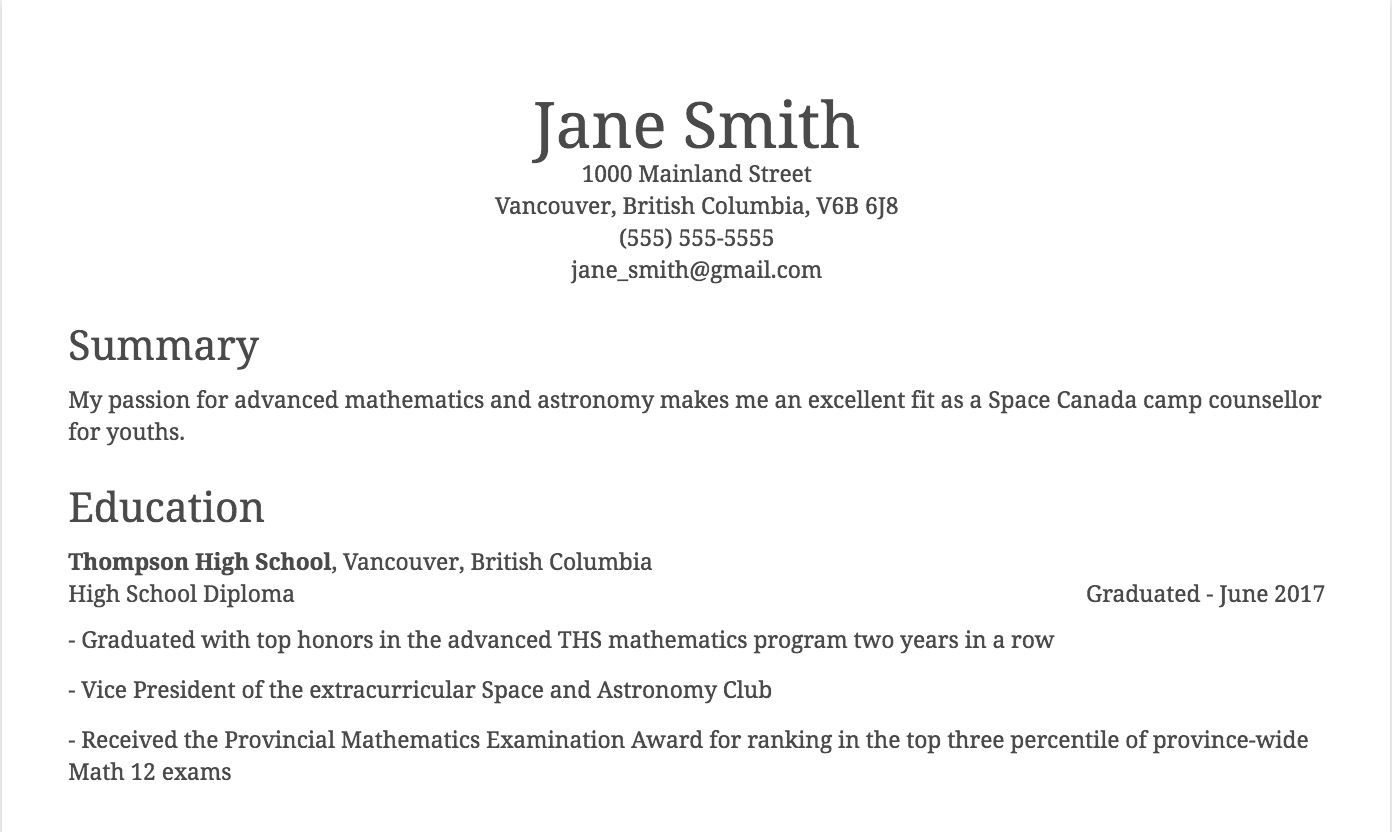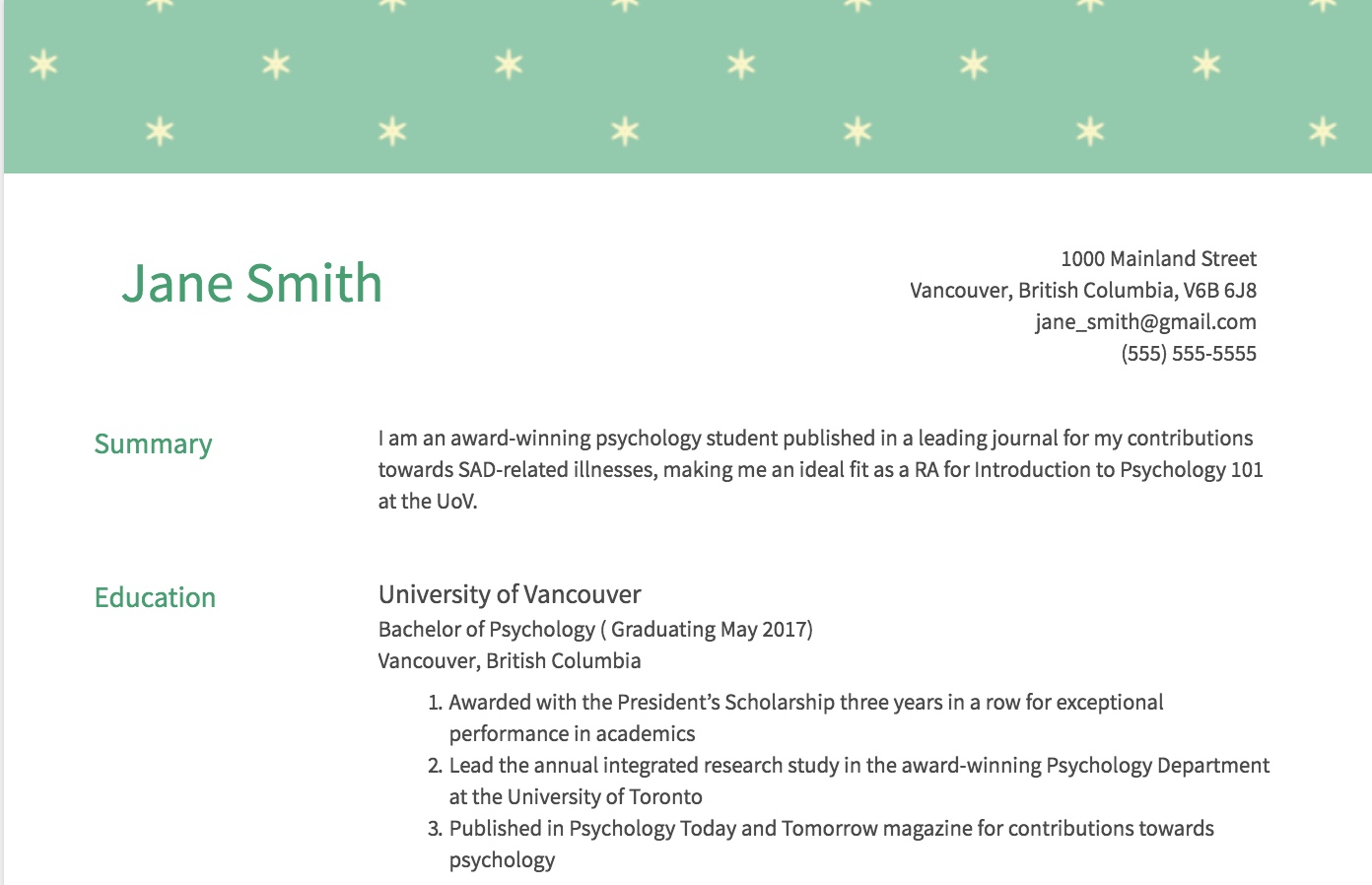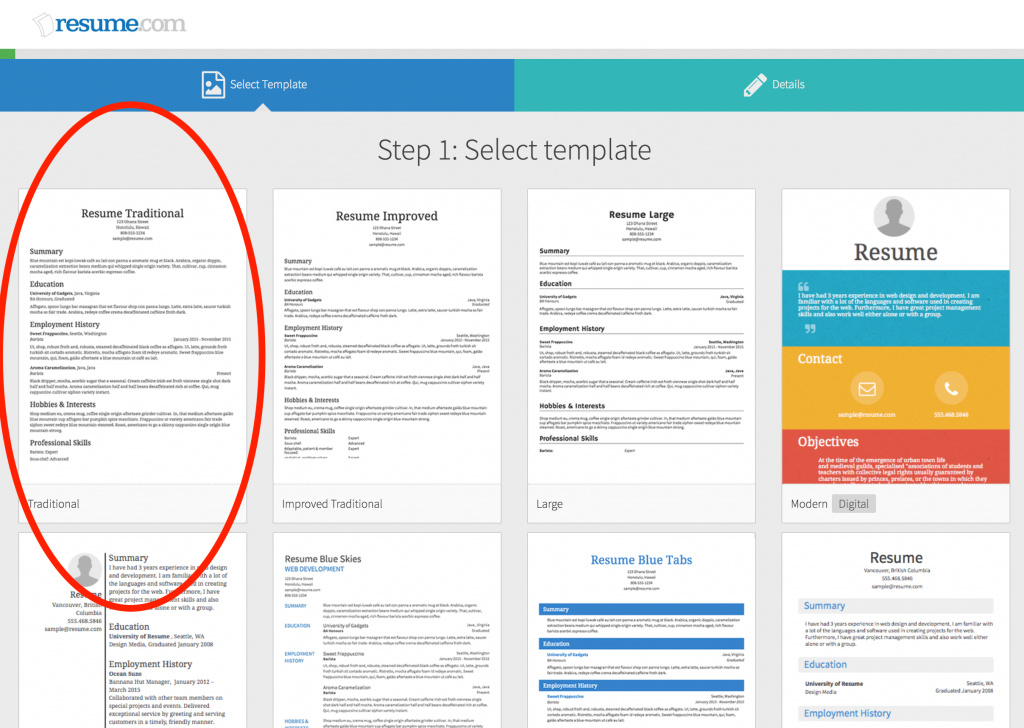How to List Academic Achievements on a Resume (3 Examples)
Writing a resume can be really challenging for a new job seeker because there are a lot of conflicting rules and advice floating around online — such as how to list academic achievements on a resume.
There are many popular rules when it comes to writing a resume, such as maintaining a one-page maximum or the right way to format a resume, but these rules are changeable depending on your familiarity with resume writing.
The more confident you are at resume writing, the easier it is to break resume writing rules. For better or for worse, there are no definitively correct rules when it comes to how to write academic achievements in a resume.
However, there are several things you should know about how to include your academic achievements on your resume that will help you create a resume that will actually get you hired — and looking at three resume examples of academic achievements is the perfect way to start!
Keep reading for three examples of academic achievements on a resume, the actual definition of an academic achievement and five academic achievement guidelines for resume writing that will help you get a job fast.
3 Examples of Academic Achievements on a Resume
Resume Academic Achievements Example 1: Traditional Resume Format
Jane Smith is applying for a Space Canada camp counsellor position. She used her advanced mathematics skills and extracurricular interest in space and astronomy in her academic achievements on her resume to increase her chances of getting hired.
Resume Academic Achievements Example 2: Stars Resume Template
Jane Smith is applying for a Research Assistant position for the Introduction to Psychology 101 course at her local university. She used her status as a published author in a psychology journal and her work experience in the psychology department in her academic achievements on her resume to get hired.
Resume Academic Achievements Example 3: Manhatten Resume Template
Jane Smith is applying for an entry-level investigative reporter position at her local newspaper. She chose to list her experience as an editor at her college newspaper, her list of published works, and the journalism scholarship she received for her graduating paper as academic achievements on her resume to help get her the job she wants.
What Is An Academic Achievement?
An academic achievement is any accomplishment you’ve made during your time in school, whether that’s in high school, college, university, post-secondary certification, or beyond.
This could include anything from your test scores to awards to scholarships to being asked to lead a research study. It could literally be any experience or accomplishment that you’re proud of that’s associated with school or your education.
However, your resume shouldn’t just be a list of everything you’ve ever achieved during your time at school.
When you’re narrowing down what types of achievements to put on a resume, remember that they should be relevant to your professional life.
That is, the academic achievements you choose to list on your resume should work towards convincing the hiring manager that you’re worth hiring.
How to List Academic Achievements in a Resume
While there are no definitive rules for how to write academic achievements in a resume, there are general guidelines that most job seekers stick to when they add achievements in a resume.
These resume writing guidelines ensure that a hiring manager can easily read and understand why your academic achievements on your resume should matter to them.
Here are five guidelines to how to list academic achievements on a resume:
1. Consistent, Traditional Formatting
Your academic achievements should be formatted to be consistent with the rest of your resume.
When the formatting of a resume is inconsistent, it’s difficult to read, which defeats the purpose of a resume. The goal is to have a hiring manager read and appreciate the skills and abilities you have.
You might be surprised how often I see resumes with mish-mashed fonts, uneven borders, mismatched colors, and different text sizes. Needless to say, these resumes are frustrating to read, which is probably the last emotion you want to evoke in a potential employer.
It’s really important that your resume looks professional; which, for most job seekers, this means simple and traditional. That means that you should use a simple font like Times New Roman or Helvetica in the font size 11 to 16, depending on the type of text (heading or paragraph text).
If you’ve never written a resume before, I would recommend that you stick to a traditional style resume template using an online resume maker to help you avoid formatting errors and create a resume that you and an employer can read through quickly and easily without getting confused.
2. Easy to Read
Your academic achievements, like the rest of your resume, should be clear and easy to read so that an employer can skim over the most important parts of your resume right away.
Studies show that hiring managers only devote a few seconds to a few minutes to reading the vast majority of resumes, so your academic achievements should be a breeze to read over.
Hiring managers should be able to understand the most important academic achievements on your resume in a few seconds. Choosing a clean font, consistent formatting, and dividing your resume into sections with headings like “Academic Achievements” are all useful tips that will boost reading comprehension.
In other words, stay away from overly creative headings, teeny tiny text sizes, and eccentric fonts unless you’re an absolute expert in your resume building abilities!
3. Be Selective
The academic achievements you list on your resume shouldn’t be all of things that you’ve accomplished at school. You only have so much room on your resume, so make sure you’re only listing academic achievements that will matter to the hiring manager.
Don’t waste valuable space by listing irrelevant academic achievements that won’t help you get hired. Tailor your list to your present career goals. The academic achievements you write should be carefully selected to say something important about you as a potential employee to the hiring manager who is reading your resume.
Example:
If you’re applying for a retail job, the perfect score you got on your latest chemistry exam probably won’t be that interesting for a hiring manager at the GAP.
On the other hand, listing that you’re a member of multiple extracurricular activities will show that you’re a multitasker who enjoys socializing with others, which are relevant skills for a sales associate or retail cashier.
4. Sends a Message About Who You Are (As an Employee)
The academic achievements on a resume should also work coherently with the rest of the skills, abilities, qualifications, and work experiences listed on your resume to send a straightforward message about who you are as an employee to a hiring manager.
Ask yourself what kind of employee you are, as well as what kind of employee the employer is describing in their job posting.
- Do you want to look responsible?
- Do you want to look creative?
- Do you want to look like a multi-tasker?
Narrow down the most important characteristics that will get you hired and then integrate them into the academic achievements on your resume.
Example:
If you’re applying for a camp counsellor position, you probably want to seem responsible and mature. You need to ask yourself what extracurriculars and scholastic accomplishments you’ve achieved help represent these characteristics.
The academic achievements on your resume should reflect the traits you want to show off, such as volunteering as a props manager for the school theatre, working as the timekeeper for the school basketball team, or being awarded with an honor roll award.
5. Proofread for Spelling and Grammar
Make sure that you proofread the academic achievements on your resume for correct spelling and grammar. It never hurts to ask a friend or family member to look over your resume.
Learn More
Now that you’ve learned about how to list academic achievements on your resume, it’s time to check out our guide on writing soft skills into your resume so you can build a complete and comprehensive resume.
When you’re ready to finish your resume, make sure to get a friend or family member to review your resume, or take advantage of Resume.com’s resume proofreading service to have a professional career advisor give your resume a final polish. Just jump into our free online resume builder and select the proofreading feature to get started!


